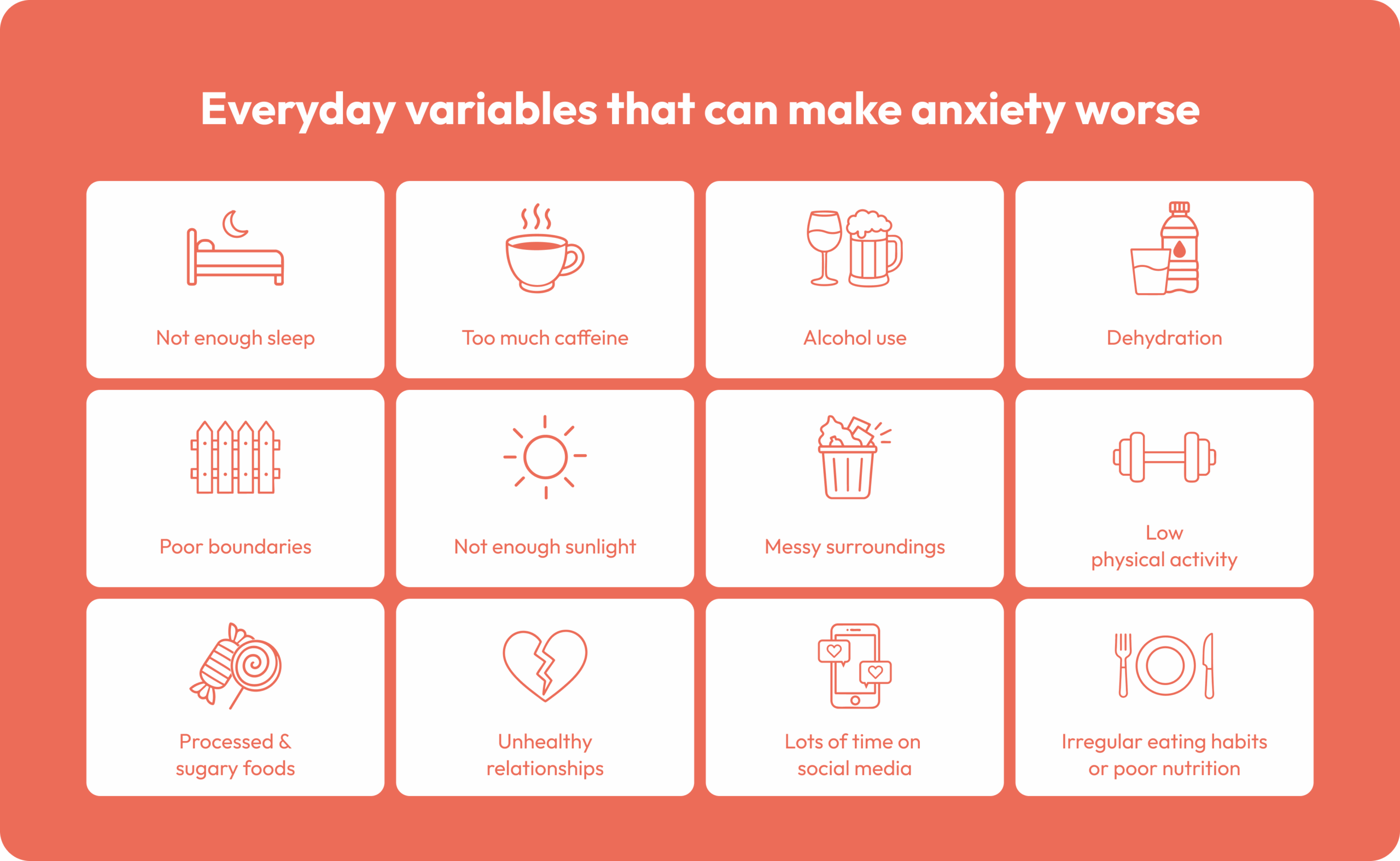Anxiety: Causes, symptoms, & treatments
If you’ve been feeling unusually on edge, perhaps feeling more restless, more worried, more sensitive to stress, and finding it more difficult to concentrate, it can be confusing, especially if anxiety has never been part of your life before. Maybe your heart suddenly races for no clear reason, or small problems feel overwhelming in a way they never used to. Perhaps you’re having trouble relaxing at night, or waking up with a sense of dread that you can’t easily explain.
Many women are surprised to learn that these shifts may be connected to hormonal changes during perimenopause and menopause. Anxiety during this transition is incredibly common, yet it often goes unrecognized or gets dismissed as just stress, just aging, or just life being busy.
But there is a physiological reason your mind and body may be reacting differently, and once you understand what’s behind it, you can take steps to feel more in control again.
What causes anxiety during menopause and perimenopause?
Anxiety isn’t just all in your head. No. Not even close. Hormones influence your nervous system, your stress response, your brain, and even how your body interprets everyday sensations; all of which have an effect on your entire body and can increase anxiousness.
During perimenopause and menopause, estrogen and progesterone begin to fluctuate unpredictably before gradually declining. These hormones are significant in regulating mood, calming the nervous system, supporting sleep, and maintaining emotional balance, among many other things. When their levels shift, so can your sense of stability.
A 2023 study in Frontiers in Psychiatry found that anxiety is significantly more common in women experiencing menopausal symptoms, and the severity of anxiety closely tracks with hormonal fluctuations.
Changing estrogen levels
Estrogen interacts directly with neurotransmitters like serotonin, dopamine, and GABA (gamma-aminobutyric acid), which helps slow down overactive nerve activity, which then reduces feelings of stress, tension, and anxiety—these are all chemicals that help you feel calm, steady, and resilient. When estrogen swings up and down, these systems become more reactive. This can lead to irritability, racing thoughts, restlessness, and an uncomfortable “wired” feeling, characterized by a huge sense of apprehensiveness or a heavy weight on your chest, seemingly for no reason at all.
Declining progesterone
Progesterone has a naturally calming effect on the brain. As it decreases, your nervous system may feel more revved up or ill at ease, making stress harder to tolerate and anxious feelings easier to trigger. You might be sitting in a Zoom meeting and suddenly feel sweaty, clammy, or like you can’t quite catch your breath, even though nothing stressful is happening. Moments like this can be jarring, and over time, they can start to disrupt your everyday life.
Hot flashes and sleep disruption
Hot flashes, night sweats, insomnia, sleep apnea, and anxiety can create a cycle in which poor sleep increases anxiety, making sleep even harder. Cleveland Clinic notes that sleep disruption is one of the strongest predictors of mood changes during menopause.
Physical sensations that mimic panic
Rapid heartbeat, sweating, and sudden warmth (common in perimenopause) can feel similar to anxiety or panic symptoms. The body reacts physically, and the mind sometimes follows. These sensations can be triggered by even the smallest of moments, like a deadline at work or meeting someone new.
Life-stage stressors
Perimenopause and menopause often overlap with other major stressors like work demands, aging parents, teenagers at home, or shifting relationships. Hormonal changes can make you more sensitive to these pressures.
Johns Hopkins Medicine notes that many women experience new or worsening anxiety during this transition, even if they’ve never had anxiety before. It is a whole-body response, not a sign that you’re overreacting or losing control.
What menopause anxiety feels like
Anxiety during menopause and perimenopause can look different for every woman. Women often describe:
- A sudden sense of dread with no clear trigger
- Feeling on edge or easily overwhelmed
- Heart palpitations or a fluttering sensation in the chest
- Constant worrying or rumination
- Restlessness or trouble sitting still
- Difficulty concentrating or staying focused
- Irritability or feeling emotionally amped up
- Nighttime anxiety or waking with a pounding heart
- A sense that your body is overreacting to small stressors
- A heavy weighted feeling on the chest, like there’s a hole or an ache
Some women feel it in waves that come and go. Others notice it building slowly over months. Both patterns are normal occurrences.


How to relieve anxiety during perimenopause and menopause
There are multiple ways to ease anxiety during this transition, including evidence-based methods, from medical treatments to daily habits that help your nervous system feel more supported.
Menopause hormone therapy (MHT)
For many women, restoring estrogen or progesterone levels with menopause hormone therapy can significantly reduce anxiety and mood-related symptoms.
Dr. Sheryl Ross (Dr. Sherry), Chief Medical Officer of Women’s Health here at QuickMD, explains, “For low-risk women, MHT can safely reverse menopausal symptoms including hot flashes, sweating, insomnia, depression, anxiety, apprehensive feelings, fatigue, poor concentration, memory loss, vaginal dryness, and heart palpitations. It can also protect against bone loss.”
Because estrogen influences serotonin, GABA, and other brain pathways tied to emotional steadiness, MHT can help restore a sense of calm and mental clarity. Many women notice that once their hormones are balanced, they feel more like themselves again, where they’re less reactive, more grounded, and more capable of handling the daily stressors of life.
Therapy, self-care approaches, and supportive treatments
Psychological and all-encompassing approaches can also help calm anxious sensations and retrain your stress response.
Dr. Sherry notes, “Acupuncture and relaxation techniques including mindfulness, biofeedback, hypnosis, cognitive behavior therapy, yoga, and Tai Chi may be helpful in controlling mood swings, depression, anxiety, hot flashes, and other mild symptoms of menopause.”
These approaches help you reduce physical tension, quiet overactive thoughts, and build coping tools for the moments when anxiety spikes without warning.
Cognitive behavioral therapy (CBT), in particular, has strong research support for menopausal anxiety and hot flash–related anxiety.
Getting quality sleep
Even one night of poor sleep can heighten anxiety. Weeks or months of disrupted rest can make your nervous system feel like it’s constantly running hot.
As Dr. Sherry explains, “Sleeping well improves mood, reduces mental stress, anxiety, depression, irritability, and brain fog.”
Supporting sleep, whether through behavioral changes, MHT, or targeted therapies like CBT-I (cognitive behavioral therapy for insomnia), can make a dramatic difference in anxiety levels.
Antidepressants and nonhormonal medications
For women who cannot use hormone therapy or prefer nonhormonal approaches, certain antidepressants may help.
Dr. Sherry shares, “Some antidepressants have been found to lessen menopausal symptoms, including hot flashes, night sweats, mood swings, depression, and anxiety. Unfortunately, some of the side effects of antidepressants, such as low libido and weight gain, can discourage their use. As long as the benefits outweigh the risks, it’s a viable treatment option worth exploring.”
SSRIs and SNRIs are types of antidepressants that help rebalance the brain chemicals involved in mood and stress. Even though they’re called antidepressants, they’re commonly used to treat anxiety, too, when paired with frequent hot flashes or sleep disruption.
Daily habits that support a calmer nervous system
Small, steady lifestyle changes can help your body feel more grounded:
- Movement improves mood, lowers stress hormones, and boosts neurotransmitters that help you feel calm.
- Balanced blood sugar can prevent anxiety spikes. Eating regular meals with protein, healthy fats, vegetables, and fiber helps keep your energy and mood steady.
- Limiting alcohol and caffeine can reduce jitteriness, palpitations, and sleep disruption.
- Reducing stress load through boundaries, rest, or simplified routines can make symptoms feel less overwhelming.
These changes work best when paired with medical guidance, but each one contributes to a more stable emotional foundation.
Feeling more anxious than usual? See how hormone therapy can help you find your balance again.
Hormonal changes during menopause can heighten anxiety, worry, or restlessness, even if you’ve never struggled with it before. You don’t have to push through it alone. QuickMD doctors can help restore hormonal balance to support a calmer mind, steadier mood, and sense of control.
We just launched our Menopause Hormone Therapy Membership in select states, and your first month’s on us. You’ll get to meet with a doctor, ask all your questions, and see if treatment might help.
If you love it and want to keep going, it’s $ 79/month after that, with special member pricing on medication and regular access to your doctor. And if you decide it’s not for you – that’s totally fine too. Get started by booking your free visit now.

